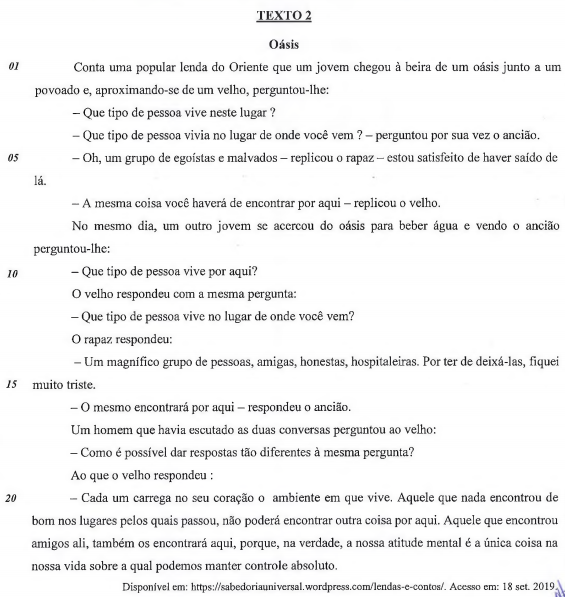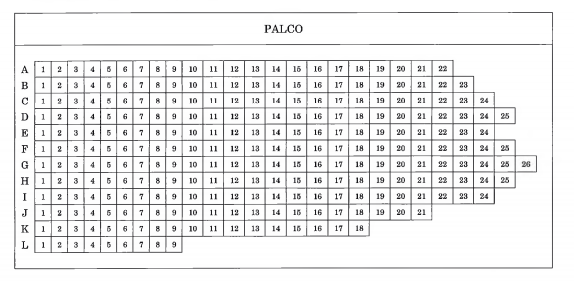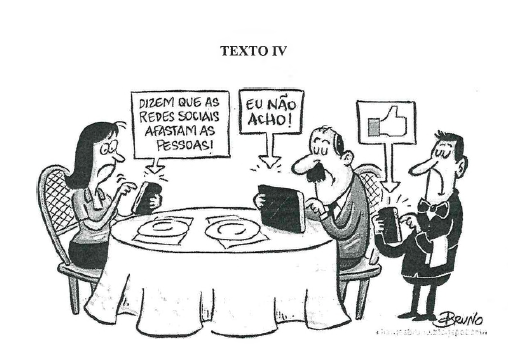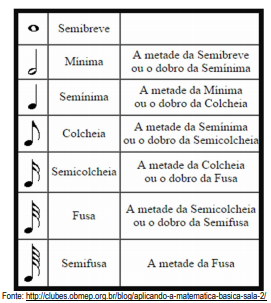Questões Militares
Foram encontradas 10.892 questões
Resolva questões gratuitamente!
Junte-se a mais de 4 milhões de concurseiros!

Disponível em: https://aberturasimples.com.br.infografico. Acesso em: 19 set. 2019.

Considerando as informações textuais e as condições de produção e de recepção, é possível afirmar que o Texto 2 (Oásis) e o Texto 4 (Plano da felicidade)
TEXTO 1


Com relação ao sinal indicativo de crase, analise os termos destacados nos excertos reproduzidos abaixo e marque a única alternativa correta.

Texto I
Água doce, doce água
De mar é feita a terra,
De água é feita a gente.
Abaixo o desperdício!
Poupar água: coisa urgente!
Clara, doce ou gelada,
Verde, azul ou transparente,
Sem a água não há nada.
Nem floresta, nem semente.
Água doce mata a sede,
Água doce é a que lava.
Cachoeira, rio ou fonte…
Só não pode ser salgada.
Tanto bate até que fura,
Diz ditado popular…
Cuida dela! Você jura?
Vamos economizar!
Disponível em: https://escolaeducacao.com.br/poemas-sobre-a-agua/ Acesso em 18 Outubro 2019
Texto I
Água doce, doce água
De mar é feita a terra,
De água é feita a gente.
Abaixo o desperdício!
Poupar água: coisa urgente!
Clara, doce ou gelada,
Verde, azul ou transparente,
Sem a água não há nada.
Nem floresta, nem semente.
Água doce mata a sede,
Água doce é a que lava.
Cachoeira, rio ou fonte…
Só não pode ser salgada.
Tanto bate até que fura,
Diz ditado popular…
Cuida dela! Você jura?
Vamos economizar!
Disponível em: https://escolaeducacao.com.br/poemas-sobre-a-agua/ Acesso em 18 Outubro 2019
Releia o verso retirado da terceira estrofe do texto I:
“Água doce é a que lava.”
elemento coesivo em destaque é um(a)
Texto I
Água doce, doce água
De mar é feita a terra,
De água é feita a gente.
Abaixo o desperdício!
Poupar água: coisa urgente!
Clara, doce ou gelada,
Verde, azul ou transparente,
Sem a água não há nada.
Nem floresta, nem semente.
Água doce mata a sede,
Água doce é a que lava.
Cachoeira, rio ou fonte…
Só não pode ser salgada.
Tanto bate até que fura,
Diz ditado popular…
Cuida dela! Você jura?
Vamos economizar!
Disponível em: https://escolaeducacao.com.br/poemas-sobre-a-agua/ Acesso em 18 Outubro 2019
Em relação ao título do texto I:
“Água doce, doce água”, analise as afirmativas a seguir:
I. A posição do adjetivo não altera o sentido das frases.
II. “Água doce” refere-se à água dos rios, por exemplo.
III. À “doce água” não se atribui um sentido poético.
Está(ão) correta(s) somente a(s) afirmativa(s)
Texto I
Água doce, doce água
De mar é feita a terra,
De água é feita a gente.
Abaixo o desperdício!
Poupar água: coisa urgente!
Clara, doce ou gelada,
Verde, azul ou transparente,
Sem a água não há nada.
Nem floresta, nem semente.
Água doce mata a sede,
Água doce é a que lava.
Cachoeira, rio ou fonte…
Só não pode ser salgada.
Tanto bate até que fura,
Diz ditado popular…
Cuida dela! Você jura?
Vamos economizar!
Disponível em: https://escolaeducacao.com.br/poemas-sobre-a-agua/ Acesso em 18 Outubro 2019
Texto I
Água doce, doce água
De mar é feita a terra,
De água é feita a gente.
Abaixo o desperdício!
Poupar água: coisa urgente!
Clara, doce ou gelada,
Verde, azul ou transparente,
Sem a água não há nada.
Nem floresta, nem semente.
Água doce mata a sede,
Água doce é a que lava.
Cachoeira, rio ou fonte…
Só não pode ser salgada.
Tanto bate até que fura,
Diz ditado popular…
Cuida dela! Você jura?
Vamos economizar!
Disponível em: https://escolaeducacao.com.br/poemas-sobre-a-agua/ Acesso em 18 Outubro 2019
Acerca do texto I, analise as afirmativas a seguir:
I. Somente a água doce é boa para os seres vivos.
II. A água salgada é mais escassa do que a doce.
III. O eu-lírico demonstra-se engajado nas questões relativas à água.
IV. Há um apelo quanto à preservação da água.
Está correto o contido em:
Texto I
Água doce, doce água
De mar é feita a terra,
De água é feita a gente.
Abaixo o desperdício!
Poupar água: coisa urgente!
Clara, doce ou gelada,
Verde, azul ou transparente,
Sem a água não há nada.
Nem floresta, nem semente.
Água doce mata a sede,
Água doce é a que lava.
Cachoeira, rio ou fonte…
Só não pode ser salgada.
Tanto bate até que fura,
Diz ditado popular…
Cuida dela! Você jura?
Vamos economizar!
Disponível em: https://escolaeducacao.com.br/poemas-sobre-a-agua/ Acesso em 18 Outubro 2019
De acordo com o contexto do Texto I, observe o trecho a seguir e selecione a alternativa que representa uma inferência correta para o verso em destaque:
Tanto bate até que fura,
Diz ditado popular…
Texto I
Água doce, doce água
De mar é feita a terra,
De água é feita a gente.
Abaixo o desperdício!
Poupar água: coisa urgente!
Clara, doce ou gelada,
Verde, azul ou transparente,
Sem a água não há nada.
Nem floresta, nem semente.
Água doce mata a sede,
Água doce é a que lava.
Cachoeira, rio ou fonte…
Só não pode ser salgada.
Tanto bate até que fura,
Diz ditado popular…
Cuida dela! Você jura?
Vamos economizar!
Disponível em: https://escolaeducacao.com.br/poemas-sobre-a-agua/ Acesso em 18 Outubro 2019
Selecione a alternativa cuja palavra complete corretamente a ideia a seguir a respeito do texto I:
“O poema apresenta uma _________________ com relação ao desperdício de água.”
NÃO PERCA A HORA!
Brasília, além de centro das decisões nacionais, é referência para a hora oficial do país. Se você ligasse o rádio agora, provavelmente ouviría: “Em Brasília, dez horas e trinta e dois minutos”. O horário de Brasília, porém, não se aplica a todos os estados brasileiros, dada a extensão territorial do país. Na verdade, o Brasil possui outros três fusos horários: a Ilha de Fernando de Noronha (da região Nordeste) tem uma hora adiantada em relação à capital federal; já Amazonas (AM) e Acre (ambos da região Norte) estão, respectivamente, uma e duas horas atrasados em relação a Brasília. Isso significa que, se o horário atual de Brasília for 10h32min, os horários de Fernando de Noronha, Amazonas e Acre serão, nesta ordem, 1 lh32min, 09h32min e 08h32min.
Não bastassem essas diferenças, há ainda a particularidade do Horário Brasileiro de Verão (HBV), quando os estados das regiões Sul, Sudeste e Centro-Oeste, que seguem o horário oficial de Brasília, adiantam os relógios em uma hora. O último HBV vigorou de 04 de novembro de 2018 até 16 de fevereiro de 2019. Dessa forma, à zero hora do dia 17 de fevereiro de 2019, o horário oficial do Distrito Federal e dos dez estados das regiões supracitadas foi atrasado em uma hora.
Disponível em: www.horadebrasilia.com/inso-horario.plip - com adaptações. Acesso em: 27 ago. 2019.
Uma equipe de atletas do Colégio Militar de Manaus (CMM), localizado no estado do Amazonas, deslocou-se, em um voo que durou quatro horas, do Aeroporto Internacional Eduardo Gomes (AM) às 23h00min (horário local do Amazonas), do dia 16 de fevereiro de 2019, rumo ao Rio de Janeiro (situado na região Sudeste). Uma hora após o término do voo, a equipe seguiu, de ônibus, em uma viagem que durou duas horas, para a Academia Militar das Agulhas Negras (AMAN), localizada em Resende (município do estado do Rio de Janeiro).
Assinale a alternativa cujas localidades, conforme o texto acima, têm horários iguais durante a vigência do HBV:
O passeio chegou ao fim!
Após observar a cidade de Porto Alegre de um ponto de vista diferente, você resolveu deixar um bilhete escondido em um dos bancos do ônibus, contendo uma frase escrita na forma de enigma, na expectativa de que algum passageiro possa encontrá-lo e decifrá-lo num próximo passeio da Linha Turismo.
Neste enigma, cada letra corresponde a um símbolo diferente e cada símbolo, por sua vez, corresponde a um algarismo ou operação diferente (adição, multiplicação ou subtração).
Na tabela abaixo encontra-se a correspondência entre as letras e os algarismos ou operações.

Para associar cada símbolo a um algarismo ou operação, é necessário resolver os cinco
cálculos abaixo. Mas atenção: sabe-se que não está associado ao algarismo 6 e que
não
está associado ao algarismo 7.

Descoberta a associação e fazendo a correspondência entre as letras e os símbolos, qual das
alternativas abaixo contém a frase PORTO ALEGRE É DEMAIS escrita com símbolos?
Ao chegar ao Centro Histórico de Porto Alegre, você avista o Teatro São Pedro, famoso espaço de espetáculos. Ele possui 650 lugares, distribuídos entre camarotes, galerias e platéia central. Na platéia central, as poltronas são identificadas por uma letra e um número: a letra identifica a fileira e o número identifica a posição da poltrona na fileira. A figura abaixo ilustra uma adaptação da posição das poltronas da platéia central do Teatro São Pedro.

Os espectadores Ana, Bento, Caio, Dani e Edu aguardam o início de um espetáculo, sentados em suas poltronas, de frente para o palco. As posições das poltronas dos cinco espectadores estão descritas a seguir.
• Ana está sentada 2 fileiras atrás de Bento e 14 poltronas à direita de Edu;
• Bento está sentado 4 fileiras atrás de Dani e 7 poltronas à esquerda de Caio;
• Caio está sentado 1 fileira à frente de Bento e 8 poltronas à esquerda de Ana;
• Dani está sentada 3 fileiras à frente de Caio e 3 poltronas à direita de Bento;
• Edu está sentado 5 fileiras à frente de Ana e 2 poltronas à esquerda de Dani.
Em quais poltronas Ana, Bento, Caio, Dani e Edu, respectivamente, podem estar sentados?
Com base no texto, responda a questão.

Essa história em quadrinhos se comunica com o leitor por meio de palavras e imagens. Observando a
fala de Calvin no primeiro e no último quadrinho, é correto perceber que ele expressa, respectivamente,

De acordo com a leitura analítica do texto IV, assinale a afirmativa correta:
A duração de execução de cada uma das notas musicais em uma partitura é indicada pela figura que se utiliza para representar essas notas. A nota de maior duração é chamada de semibreve. As outras possíveis durações correspondem a frações da semibreve, conforme a tabela abaixo.

De acordo com a tabela, a soma das durações das 4 notas abaixo corresponde à duração de

Quitéria adora jogos e também matemática. Certo dia, ela pegou dois cubos de madeira e escreveu, em cada uma das faces, um único número racional. Ela o fez de modo que a soma dos números de quaisquer das duas faces opostas sempre fosse igual a 1. Dessa forma, Quitéria fabricou os dois dados ilustrados a seguir:

Quitéria lançou esses dois dados sobre uma mesa plana e
verificou que a soma dos números escritos nas 10 faces
visíveis era 4 3/7 .
É possível afirmar que, nessa situação, a soma dos números
escritos nas duas faces voltadas para cima era
Em 17 de julho de 2019, foi realizada a cerimônia de entrega do 400° Veículo Blindado de
Transporte de Pessoal Médio Sobre Rodas (VBTP-MSR) Guarani ao Exército Brasileiro (EB). O
veículo foi desenvolvido por meio de uma parceria entre a IVECO e o EB, e irá substituir os
blindados VBTP EE-11 Urutu e VBR EE-9 Cascavel.
Em 2013, a italiana IVECO inaugurou, no complexo industrial de Sete Lagoas (MG), sua primeira unidade de veículos militares fora da Europa, o que tornou possível a concretização do Projeto Guarani. O índice de conteúdo nacional, na produção do blindado, é superior a 60%.

Com capacidade para transportar até 11 militares, o Guarani pesa 18 toneladas, possui tração 6x6, transmissão automática, podendo chegar a 110 km/h e, também, possui a função anfíbia. Além de ar-condicionado, apresenta uma série de inovações tecnológicas, como sistema automático de detecção e extinção de incêndio, baixa assinatura térmica e sistema de radar, entre outros. As dimensões básicas do blindado são 6,91 m de comprimento, 2,70 m de largura e 2,34 m de altura.
Adaptado de: www.defesanet.com.br/guarani/noticia/28721/Guarani-300-sera-entregue-pela-IVECO-para-o-Exercito-Brasileiro/
e de www.defesanet.com.br/guarani/noticia/33562/GUARANI-—IVECO-Veiculos-de-Defesa-entrega-ao-Exercito-a-viatura-n—400/
Acesso em 22/08/2019.
Se construirmos uma miniatura do veículo blindado Guarani, na escala 1:18, podemos afirmar
que sua altura, em centímetros, será de
O CMSM possui vários laboratórios voltados para a aplicação prática daquilo que é apresentado teoricamente em sala de aula. Um deles é o Laboratório de Química, local em que se pode encontrar uma grande variedade de reagentes, uma disponibilidade de espaço físico e materiais para uso individual por parte dos alunos, voltados para a aprendizagem dos educandos. Para obter o resultado desejado nas combinações, pode-se usar o tubo de ensaio e o balão de fundo chato. O tubo de ensaio tem a capacidade de armazenamento de 80 ml enquanto o balão de fundo chato armazena até 1,120 litros.

Usando como referência a capacidade de armazenamento de um tubo de ensaio, determine quantas vezes, no mínimo, serão necessárias usar este instrumento para encher 3/7 de um balão de
fundo chato.